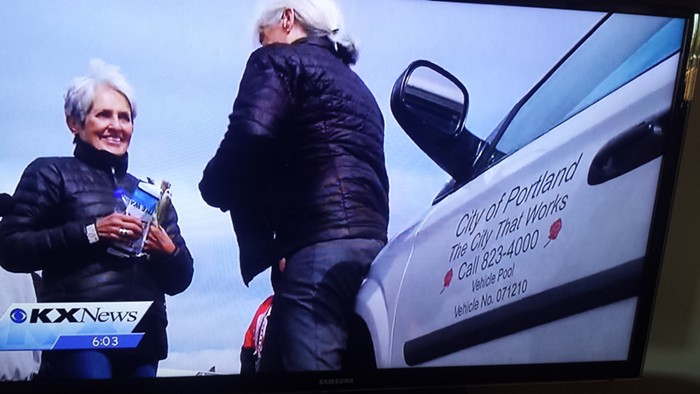LAST SEPTEMBER, the Portland City Council stood with Standing Rock.
As voices around the country called for a halt to the Dakota Access Pipeline (DAPL) that could carry millions of gallons of crude oil beneath the Standing Rock Sioux Tribe’s sole water source (and has just been given new life by Donald Trump), local officials joined the fray.

“The City of Portland stands in solidarity with the Standing Rock Sioux Tribe and other communities opposing the pipeline...” read a resolution [PDF] that passed unanimously on September 7.
It was a fairly routine symbolic gesture except for one thing: The DAPL item had been prepared by Patricia Davis Gibson, Portland’s brand new tribal liaison.
After years of calls for a city official who could help Portland better engage local tribal governments and its Native American residents, former Mayor Charlie Hales’ office took action last year—securing roughly $108,500 in ongoing funds and convening a selection committee. In his last major hire as mayor, Hales tapped Davis Gibson—a Lewis & Clark Law grad, formal tribal judge, and member of the Comanche Tribe of Oklahoma—to the job. She began August 15.
“This position is long overdue for the City of Portland, and we could not have found a better candidate,” Hales said in a press release.
Less than six months later after that release, Davis Gibson now lives in Wyoming and her position sits empty.
In a scenario that has inspired grumbling both inside City Hall and out, she was not among staffers retained in the transition from Hales to Mayor Ted Wheeler, and Wheeler didn’t tap a replacement. The mayor’s office is pledging to conduct a brand new hiring process in the near future, though a member of its staff participated in Davis Gibson’s selection.
The hiccup has led to varying accounts of what happened to Davis Gibson’s short tenure. Several people the Mercury spoke to said Wheeler’s office would have had plenty of notice the new position existed and was fully funded.
“It’s unfortunate that Pat Gibson was not invited back early enough,” says Commissioner Amanda Fritz. “We did remind [Wheeler’s team] before they were in office that this position was there, and we also said how great Pat was.”
“The mayor-elect said he knew of the position—he heard from me directly on a number of occasions,” says Paul Lumley, executive director of Portland’s Native American Youth and Family Center, who helped write the job description for the liaison position. “Maybe during the transition it’s hard to keep all the balls up in the air.”
That’s how Davis Gibson views the end of her stint in City Hall. She says she’d been hoping to be contacted by Wheeler’s transition team about staying on. When that didn’t happen by the second half of November, she gave notice she’d be resigning as of December 28. She’s now director of an environmental organization in Sheridan, Wyoming.
“This isn’t my first political rodeo, and it’s not a good sign when someone’s not reaching out to you,” Davis Gibson tells the Mercury. She says Wheeler’s chief of staff, Maurice Henderson, “talked to me and said basically this just fell off the radar.”
Wheeler’s office offers another version of events. Spokesperson Michael Cox says the mayor relied on communications from Hales’ team when settling on new staffers, and that Henderson and Davis Gibson met twice. By the time they had their first meeting on November 23, though, Davis Gibson had already given notice she was leaving.
“We were brought into the hiring process at the final stage and only as a courtesy,” says Cox, who helped scrutinize Davis Gibson and other finalists on Wheeler’s behalf. “Our preference would have been to hire for the position for the first time once we took office, conducting our own outreach and setting up our own process.”
Wheeler will hire a new liaison, Cox says, and is preparing a new selection process. That news, delivered late last week, came as a relief to people like Lumley, who view the liaison position as crucial.
During her brief stint, Davis Gibson helped push through a long-dormant agreement between the city and the Confederated Tribes of the Grand Ronde, lent assistance regarding the Portland Harbor Superfund site, and paid official visits to local tribes.

She also went on one pilgrimage that’s raised some eyebrows. Two days after council passed the Standing Rock resolution, Davis Gibson took a week-long trip to the North Dakota reservation in a city vehicle. She says she’d been asked by the Standing Rock Sioux to hand-deliver the council’s letter of solidarity.
According to records obtained by the Mercury, the 2,600-mile round trip cost the city $1,590, between lodging, meals, and transportation. It also spurred a complaint to the city’s Ombudsman’s Office.
Davis Gibson says she drove because she “wasn’t flying at the time” due to migraines, and that she was well received in North Dakota. “The Standing Rock Sioux Tribe really appreciated that gesture,” she says.
Whomever Wheeler taps to take the liaison role, it won’t be directly under him, as it was with Hales. Cox says the mayor intends to place the position in the city’s Office of Government Relations. (Hales’ office tried to do that, but met pushback by the office’s then-director, Martha Pellegrino.)
That would mean potentially more stability for the job, something Davis Gibson says is necessary. As she notes: “There were all sorts of things I wanted to do, but you can’t do much in four months.”


















